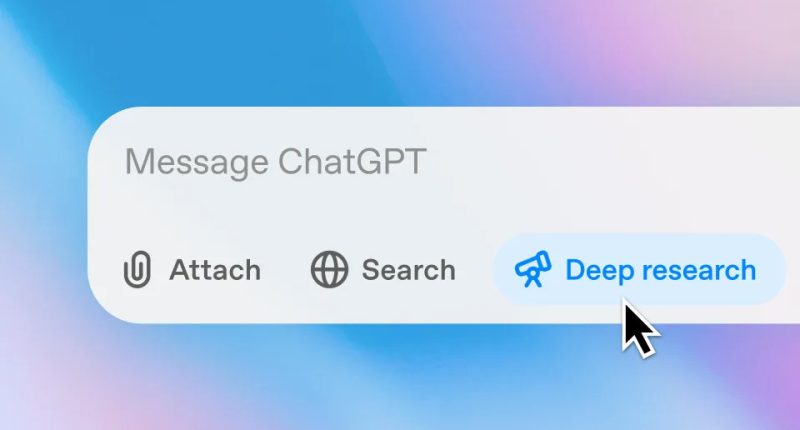A few days after it launched Operator, OpenAI has now revealed Deep Research, a new AI agent that will enable ChatGPT to perform what it describes as “multi-step research on the internet for complex tasks.” According to the firm, the newest feature is particularly useful for tasks that go beyond simple question answering, such as researching complex topics or providing detailed information across a wide range of fields, including finance, science, policy, and engineering (in other words, areas where users need more than a quick answer). Users can find the “Deep Research” option in the ChatGPT message composer.
Unlike the normal version of ChatGPT – which provides brief answers – Deep Research takes it one step further. OpenAI notes that the tool is powered by its o3 model, which has been (according to the firm) fine-tuned for web browsing and data analysis. The model is thus able to navigate through vast amounts of information — scanning text, images, PDFs, and other data formats – aggregate the same, and generate a comprehensive report on the same. Users can input their queries along with supplementary files — such as PDFs, spreadsheets, or images — to give context to their questions. Once a query is submitted, the tool can take anywhere from five to 30 minutes to complete the research process. During this time, a sidebar displays the research steps and citations, and the user will be notified when the search process is completed.
“Our ultimate aspiration is a model that can uncover and discover new knowledge for itself,” Mark Chen, chief research officer at OpenAI, commented on the development.
If the feature works as advertised, then it could be a game-changer for students and researchers. Deep Research offers a faster and more efficient method of conducting literature reviews and data analyses – by automating the process of gathering information from hundreds of sources, Deep Research can reduce the time required to compile detailed research reports (leaving the researcher(s) free to focus on data collection and interpretation). In addition to this, its ability to provide clear citations and a summary of the reasoning process also makes it easier for scholars to verify sources and ensure the authenticity of the information gathered. It remains to be seen whether Deep Research is open to “hallucinations,” and whether it generates incorrect or imprecise information.
For now, the tool’s outputs currently consist of text, but OpenAI plans to integrate embedded images, data visualizations, and other analytical components in future updates. For now, this feature is being made available exclusively to ChatGPT Pro subscribers, who currently pay $200 per month, and have up to 100 queries per month. In the future, OpenAI will bring the feature to ChatGPT Plus, Team, and eventually Enterprise users, and it will bring it to users in the UK, Switzerland, and the European Economic Area later on. The service is presently web-only, and integration for mobile and desktop apps is scheduled to follow later in the month.
The Tech Portal is published by Blue Box Media Private Limited. Our investors have no influence over our reporting. Read our full Ownership and Funding Disclosure →






